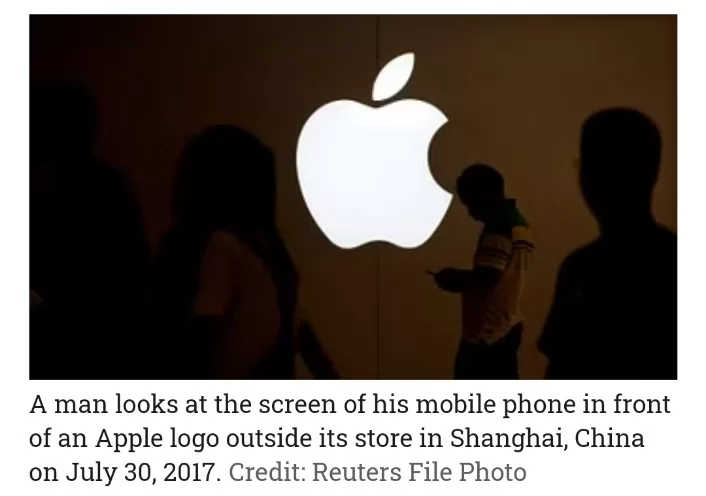In a concerning development for Apple, its shares witnessed a decline of over 3% on Thursday, following a preceding 4% drop on Wednesday. These downward trends followed reports indicating the possibility of a ban on Apple iPhones for Chinese government employees.
While these restrictions have not been officially declared by the Chinese government, apprehensions are growing that Apple’s products may become ensnared in the broader international tensions between the United States and China.
Greater China, encompassing regions such as Hong Kong and Taiwan, holds significant strategic importance for Apple, constituting approximately 18% of the company’s total revenue of $394 billion. Moreover, it serves as the primary manufacturing hub for the majority of Apple products. Apple, however, has refrained from making any official statements regarding these developments.
The reported directive from China instructs officials within central government agencies to abstain from bringing iPhones into their workplaces or utilizing them for official purposes. It remains unclear to what extent these prohibitions have been implemented. There is also speculation that such bans could extend to other state-affiliated entities and government-sponsored organizations.
While a ban limited to government employees could potentially lead to a decline in iPhone unit sales in China by as much as 5%, it poses a more substantial threat if it conveys a message encouraging ordinary citizens to opt for electronics manufactured by domestic Chinese companies.
Toni Sacconaghi, an analyst at Bernstein, noted that “restricted use of iPhones among government employees could negatively impact sales among consumers (related family members; general populace) and could be part of a broader move by the Chinese government to promote usage of domestic technology.”
In addition to the specter of government bans, Apple is contending with heightened competition from Huawei, a prominent Chinese tech company. Recent developments include Chinese retailers commencing orders for Huawei’s Mate 60 Pro, generating considerable attention on social media. This smartphone, priced starting at 6,900 RMB (approximately $954), is equipped with a chip produced by Huawei’s subsidiary, HiSilicon. Early tests suggest its compatibility with 5G networks, a notable feature, though not explicitly mentioned in Huawei’s specifications.
Huawei, which was placed on the U.S. entity list in 2019 due to national security concerns, faces restrictions in procuring technology from American companies such as Google and Qualcomm. Nevertheless, the company has persisted in its endeavors and recently launched a smartphone featuring a chip manufactured in mainland China, employing a 7-nanometer production process. This development raises questions about the efficacy of restrictions on chip-manufacturing technology, which seek to hinder Chinese companies from developing advanced processors.
As the United States grapples with these technological and security considerations, Jake Sullivan, the U.S. national security advisor, advocated for a measured approach, emphasizing a focus on national security concerns rather than broad commercial decoupling.
Apple’s performance in Greater China, indicated by an 8% increase in sales to $15.76 billion in the most recent quarter, underscores its strategic significance. CEO Tim Cook highlighted the shift of users from Android to iPhones as a pivotal factor driving this growth.
While Apple navigates the potential challenges stemming from government bans and heightened competition, it continues to endeavor to persuade users to make the switch to iPhones, emphasizing the unique experience and ecosystem it offers.
Uncertainty Surrounding Government Bans: Reports suggest that Chinese government employees could face restrictions on using iPhones, prompting a decline in Apple’s stock. These measures, not yet officially announced by China, have ignited concerns about the impact on Apple’s products amid U.S.-China tensions.
– Strategic Significance of Greater China: Greater China plays a pivotal role for Apple, accounting for a substantial portion of its revenue and serving as a vital manufacturing center. The potential ramifications of government bans in this region raise strategic concerns for the tech giant.
– Potential Consumer Impact: While government employee bans could impact iPhone sales, the greater concern lies in whether these actions signal a broader push for Chinese citizens to adopt domestic technology, posing a more significant threat to Apple.
– Huawei’s Competitive Challenge: Huawei, despite previous restrictions, has launched the Mate 60 Pro, showcasing technological prowess. It utilizes a domestically manufactured chip, potentially challenging Apple’s market position.
– Questions Surrounding Chip Restrictions: The introduction of Huawei’s chip, produced within mainland China, prompts inquiries regarding the effectiveness of restrictions on chip-manufacturing technology aimed at preventing Chinese companies from developing cutting-edge processors.
– A Balanced Approach Advocated: Amid evolving technological and security considerations, Jake Sullivan, the U.S. national security advisor, underscores the importance of a nuanced approach, emphasizing national security concerns over comprehensive commercial decoupling.
– Apple’s Growth in Greater China: Despite challenges, Apple’s performance in Greater China reflects an 8% increase in sales, reaffirming its strategic significance. CEO Tim Cook highlights user migration from Android to iPhones as a driving factor behind this growth.




